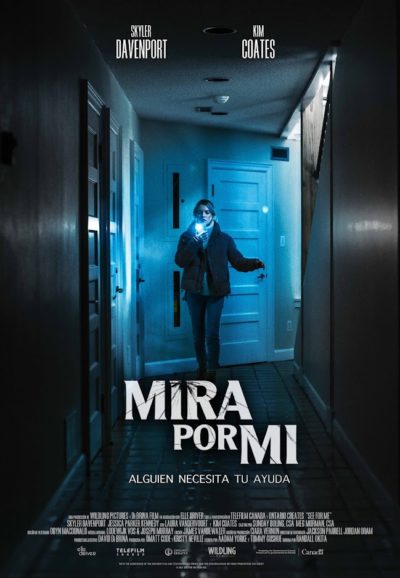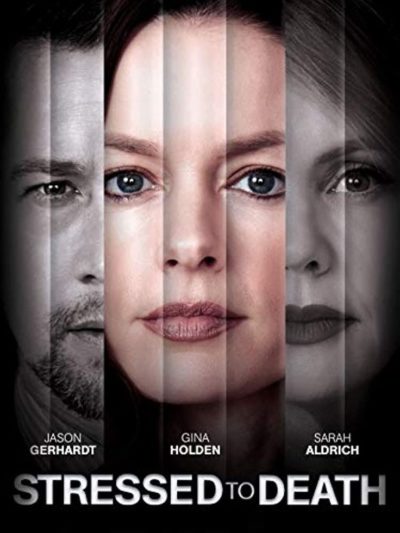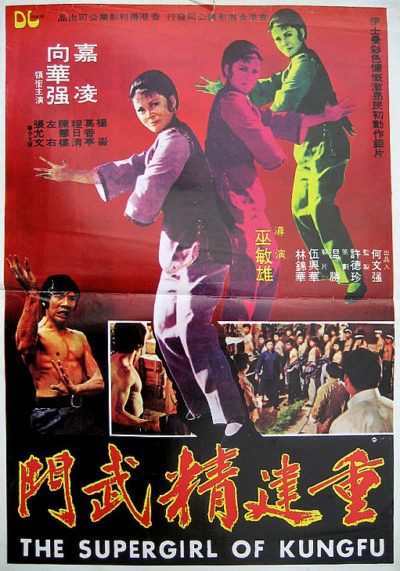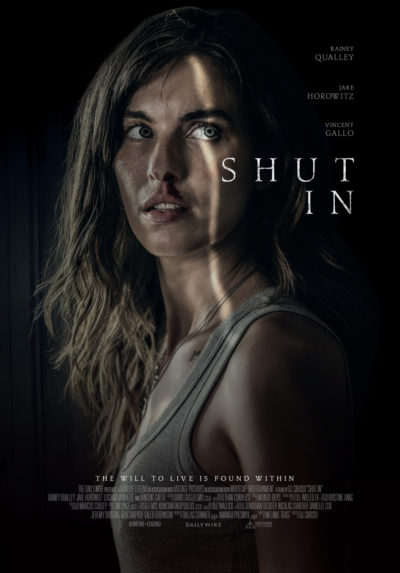★★★
“Wait Until After Dark”
 Yeah, as the above might suggest, this owes a rather large debt to Wait Until Dark, with its central theme of an attractive, blind protagonist threatened by home invaders. It is not the first to have gone down that road (see also In Darkness), and I must say, the concepts here are considerably more contrived. However, the film does just about enough to sell them, to make for an entertaining end product. The heroine Sophie (Davenport) was a promising skier until a degenerative eye condition ended her career, leaving her almost totally blind. Now, she’s rather grumpy, frequently berating her mother (Brown), and picking up occasional house-sitting gigs, engaging in small-scale larceny against her employers to fatten the paycheck.
Yeah, as the above might suggest, this owes a rather large debt to Wait Until Dark, with its central theme of an attractive, blind protagonist threatened by home invaders. It is not the first to have gone down that road (see also In Darkness), and I must say, the concepts here are considerably more contrived. However, the film does just about enough to sell them, to make for an entertaining end product. The heroine Sophie (Davenport) was a promising skier until a degenerative eye condition ended her career, leaving her almost totally blind. Now, she’s rather grumpy, frequently berating her mother (Brown), and picking up occasional house-sitting gigs, engaging in small-scale larceny against her employers to fatten the paycheck.
Her latest such position turns unpleasant when a trio of thugs, under the direction of Rico (Coates), enter the house, seeking a large stash of cash hidden behind a panel. They are as surprised by Sophie’s presence, as she is by theirs. You’d think this would be a quick, one-sided struggle. But Sophie has an ally, in the form of the titular app. It connects her with a seeing helper, typically for assistance with humdrum daily tasks, and the helper in this case is former army member Kelly (Kennedy). Between her military training and fondness for first-person shooters, she knows a thing or two about creeping stealthily around a house, and taking out enemy targets – skills she’s happy to use to assist Sophie.
What’s at least somewhat interesting, is that Davenport is legally blind. This seems an ongoing trend. While it makes sense, considering Hollywood’s recent obsession with “authenticity” in things like gender identity, I’m always reminded of the famous story about Dustin Hoffman and Lawrence Olivier from Marathon Man – “Why don’t you just try acting?” It’s also notable that she’s not your typical heroine. Indeed, she arguably borders on the unlikable, between her abrasive attitude and petty thievery. Though some other reviews I’ve read suggest that severely weakens the film, I can’t say I minded too much. My bigger concern was a plot that teetered almost forever on the edge of implausibility, e.g. the way Sophie’s phone battery went from 20% to zero in a couple of minutes. While there was nothing utterly outrageous, all these micro-implausibilities added up over the course of proceedings.
Within those constraints the film still had some successes. The best sequence probably had a police officer show up, with Sophie trying desperately to get the cop to go away. This screwed the tension level up considerably, with the officer insisting there was more going on than Sophie would admit. Thereafter, it does degenerate somewhat into lots of creeping around dark corridors. Or, at least, the level of dark corridors movies tend to have, which are just enough well-lit for a camera, and thus the audience. If the ending abandons the film’s titular concept, and probably provides the cherry of implausibility, the cake as a whole remains adequately edible.
Dir: Randall Okita
Star: Skyler Davenport, Jessica Parker Kennedy, Kim Coates, Natalie Brown





 Lou Farnt (Brayben) is stuck in her life, with a dead-end job, no apparent friends to speak of, and still living with her domineering mother (Ball). She seeks escape from one self-help guru after another, spending her money on their books, DVDs and audio-tapes, though with little or no apparent positive results. Then, she meets the unconventional Val Stone (Roe), who lives in a seaside caravan and promises to change Lou’s life forever. After some qualms, she agrees to depart with Lou, who does indeed deliver on her promise. For, as the title suggests, Val is a psychotic if smart killer, who is specifically targetting those same gurus. Either she regards them as a curse on humanity with their vapid schemes, or she simply wants to dispose of the competition.
Lou Farnt (Brayben) is stuck in her life, with a dead-end job, no apparent friends to speak of, and still living with her domineering mother (Ball). She seeks escape from one self-help guru after another, spending her money on their books, DVDs and audio-tapes, though with little or no apparent positive results. Then, she meets the unconventional Val Stone (Roe), who lives in a seaside caravan and promises to change Lou’s life forever. After some qualms, she agrees to depart with Lou, who does indeed deliver on her promise. For, as the title suggests, Val is a psychotic if smart killer, who is specifically targetting those same gurus. Either she regards them as a curse on humanity with their vapid schemes, or she simply wants to dispose of the competition. I’ve previously talked about – OK, “ranted” may not be inappropriate – the perils of message movies. But I did wonder whether it was the specific content to which I objected. Would I dislike a film so much, if I was on board with its strident message? On the evidence here, I can confidently state: hell, yes. For this is painfully earnest and hard to watch, much though I agree with the environmental topic, that humanity’s use of plastics are threatening the oceans. An alternative needs to be found. By which I mean, I strongly suggest you find an alternative to watching this movie. The poster has clearly strayed in from a far more entertaining offering, and bears little resemblance to what this provides.
I’ve previously talked about – OK, “ranted” may not be inappropriate – the perils of message movies. But I did wonder whether it was the specific content to which I objected. Would I dislike a film so much, if I was on board with its strident message? On the evidence here, I can confidently state: hell, yes. For this is painfully earnest and hard to watch, much though I agree with the environmental topic, that humanity’s use of plastics are threatening the oceans. An alternative needs to be found. By which I mean, I strongly suggest you find an alternative to watching this movie. The poster has clearly strayed in from a far more entertaining offering, and bears little resemblance to what this provides.  Subtitled, The Female Hero in Popular Cinema, 1970-2006, this is non-fiction, being a feminist – I guess, more post-feminist – analysis of action heroines over the time in question. It made for an interesting read, being considerably more dense than my typical reading material: Schubert seems to be aiming at an audience that already know what she means, with a good number of terms left unexplained in the text. Yet it was equally frustrating: for every section that had me nodding in agreement, there was one where I was at least raising an eyebrow, if not snorting derisively.Parts are incisive and smart. Others exemplify the worst excesses of ivory-tower academia.
Subtitled, The Female Hero in Popular Cinema, 1970-2006, this is non-fiction, being a feminist – I guess, more post-feminist – analysis of action heroines over the time in question. It made for an interesting read, being considerably more dense than my typical reading material: Schubert seems to be aiming at an audience that already know what she means, with a good number of terms left unexplained in the text. Yet it was equally frustrating: for every section that had me nodding in agreement, there was one where I was at least raising an eyebrow, if not snorting derisively.Parts are incisive and smart. Others exemplify the worst excesses of ivory-tower academia. The concept here is intriguing. It’s just the execution – and the script in particular – which is bad. A robbery at a convenience store ends in the death of David, the husband to Victoria Garrett (Aldrich). She blames the paramedic on the scene, former soldier Maggie Hart (Holden), for the loss of her spouse, though the incident hits Maggie equally hard. She quits her job, raising daughter Jane (Blackwell) with her husband, commercial real-estate agent, Jason (Gerhardt). But Victoria hasn’t moved on – in probably the film’s most memorably loopy elements, she feeds her husband’s ashes to a pot-plant she calls David, to which she chats. She’s also clearly a believer in that saying about revenge being served cold.
The concept here is intriguing. It’s just the execution – and the script in particular – which is bad. A robbery at a convenience store ends in the death of David, the husband to Victoria Garrett (Aldrich). She blames the paramedic on the scene, former soldier Maggie Hart (Holden), for the loss of her spouse, though the incident hits Maggie equally hard. She quits her job, raising daughter Jane (Blackwell) with her husband, commercial real-estate agent, Jason (Gerhardt). But Victoria hasn’t moved on – in probably the film’s most memorably loopy elements, she feeds her husband’s ashes to a pot-plant she calls David, to which she chats. She’s also clearly a believer in that saying about revenge being served cold. This is another one of an apparently infinite series of kung-fu films, set during the Japanese occupation of China that took place just before World War II. The heroine is Little Flower (Lee), who gets given a death-bed mission by her martial arts master father: return to Shanghai, and lead his students at the Ching Wu Men school against the occupying Japanese forces. Except, on arriving, Flower finds the school disbanded by force, and its disciples scattered to the winds. She begins to hunt the top students, Rock (Yang) and Mercury – the latter has gone particularly deep into hiding after having killed twenty Japanese soldiers in one night. But Flower’s own activities, protecting the poor, bring her to the attention of the Japanese authorities, because they think she’s part of the rebels, as well as a local Chinese cop (Heung).
This is another one of an apparently infinite series of kung-fu films, set during the Japanese occupation of China that took place just before World War II. The heroine is Little Flower (Lee), who gets given a death-bed mission by her martial arts master father: return to Shanghai, and lead his students at the Ching Wu Men school against the occupying Japanese forces. Except, on arriving, Flower finds the school disbanded by force, and its disciples scattered to the winds. She begins to hunt the top students, Rock (Yang) and Mercury – the latter has gone particularly deep into hiding after having killed twenty Japanese soldiers in one night. But Flower’s own activities, protecting the poor, bring her to the attention of the Japanese authorities, because they think she’s part of the rebels, as well as a local Chinese cop (Heung). Despite generally terrible reviews, this is definitely not, by any means, a terrible movie. It is, admittedly, a fairly generic sword-and-sorcery flick, in which a hero must rise from a common background to save the world from a terrible magical threat. But it looks spiffy – the hundred million dollar budget is on the screen. If the central performance has its issues, there’s enough around the fringes to make both for an adequately entertaining experience, and also merit the existence of a review here. In particular, the main antagonist is the evil witch Mother Malkin (Moore). She escapes from the prison to which she had been confined years ago by Gregory (Bridges), now the last survivor of his order of witch-hunters.
Despite generally terrible reviews, this is definitely not, by any means, a terrible movie. It is, admittedly, a fairly generic sword-and-sorcery flick, in which a hero must rise from a common background to save the world from a terrible magical threat. But it looks spiffy – the hundred million dollar budget is on the screen. If the central performance has its issues, there’s enough around the fringes to make both for an adequately entertaining experience, and also merit the existence of a review here. In particular, the main antagonist is the evil witch Mother Malkin (Moore). She escapes from the prison to which she had been confined years ago by Gregory (Bridges), now the last survivor of his order of witch-hunters. Janina Duszejko (Mandat) is a former engineer, who now lives in a small rural Polish town. She has a deep love of nature and animals. This is a belief not shared by many of the local population, who treat animals as a resource, put there for their benefit – an attitude which brings them into conflict with Duszejko. After her two dogs disappear, she goes to the authorities, but they blow her off. However, the man she suspects most, turns up dead – just the first in a series of mysterious deaths, that may be related to Jaroslav Wnetzak, a local businessman with a finger in a number of shady pies. Subsequent corpses include the police chief, who owes Wnetzak money.
Janina Duszejko (Mandat) is a former engineer, who now lives in a small rural Polish town. She has a deep love of nature and animals. This is a belief not shared by many of the local population, who treat animals as a resource, put there for their benefit – an attitude which brings them into conflict with Duszejko. After her two dogs disappear, she goes to the authorities, but they blow her off. However, the man she suspects most, turns up dead – just the first in a series of mysterious deaths, that may be related to Jaroslav Wnetzak, a local businessman with a finger in a number of shady pies. Subsequent corpses include the police chief, who owes Wnetzak money. Halfway through the final installment, Chris came in. She paused, watching for a moment, then said, “They spend far too much time talking, and not enough time killing.” Just a shame she waited 93 episodes to express so succinctly one of the main problems with the series. For, even if the final arc had its share of bloodshed, if you average it out per show, it’s about the level of a mid-strength nosebleed. It certainly put the novela into narconovela. Though the problems began at the start – or, rather, the end of the second series where heroine Sara Aguilar was apparently gunned down. This being a show where escape from death was common, I spent the first 20 episodes waiting for her to return. Spoiler: she doesn’t.
Halfway through the final installment, Chris came in. She paused, watching for a moment, then said, “They spend far too much time talking, and not enough time killing.” Just a shame she waited 93 episodes to express so succinctly one of the main problems with the series. For, even if the final arc had its share of bloodshed, if you average it out per show, it’s about the level of a mid-strength nosebleed. It certainly put the novela into narconovela. Though the problems began at the start – or, rather, the end of the second series where heroine Sara Aguilar was apparently gunned down. This being a show where escape from death was common, I spent the first 20 episodes waiting for her to return. Spoiler: she doesn’t. After
After